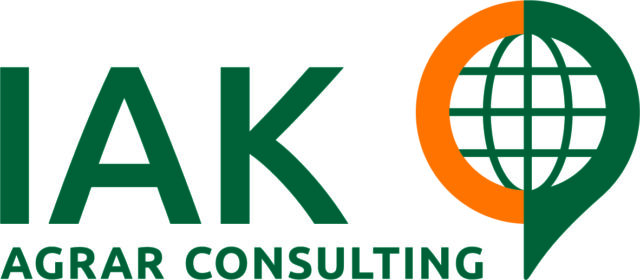IAK Agrar Consulting GmbH (IAK), headquartered in Leipzig, is an independent agricultural consultancy that has been active in international cooperation and private sector consultancy in Germany and abroad for over 40 years. Its clients in international cooperation include, e.g., BMEL, GIZ, EU and World Bank. Also, IAK works for private clients and for organisations, associations, municipalities and administrations. International cooperation focuses on creating better livelihoods for all through sustainable agricultural and food systems. Other focal points of the IAK's wide-ranging projects include agricultural policy, food security, biodiversity, bioeconomy, organic farming, agriculture and climate change, digitalisation, rural development, agricultural trade, agricultural skills development and gender equality in the agricultural and food sector. We support small and medium-sized farms and enterprises, service providers and cooperatives in agricultural and food systems along the entire value chain in their sustainable development and transformation. We follow a holistic approach to sustainability, which focuses on three areas: •Economics: to maintain an economically viable business model •Ecology: in particular to adapt to climate change and achieve greenhouse gas reduction targets •Social: to create attractive and fair working conditions. This also includes advising various institutions from politics and administration as well as organising knowledge transfer platforms.
In the German-Uruguayan Dialogue on Agriculture (DAUA) implemented by IAK, Component 1 (Micro2Health) is researching the positive potential of the soil microbiome for healthy soils and plants to contribute to long-term sustainable land use. Moreover, the dialogue is supraregional and involves experts and leaders from governmental and scientific institutions in Germany and Uruguay, as well as other Latin American research networks and projects of the BMEL’s Bilateral Cooperation Programme.
Micro2Health investigates and evaluates the performance of bioinocula in different soils, plants, and agricultural practices. In close research cooperation between the Julius Kühn Institute (JKI) and the Uruguayan National Institute for Agricultural Research (INIA), bacterial strains are being identified that can improve soil structure, promote plant growth, and alleviate drought stress. With the help of isolates from long-term trials in Uruguay, in vitro and greenhouse experiments are being conducted to test the potential of the bioinocula. These are being studied both individually and in synthetic communities (Syncom), in which different bacterial strains are combined to improve plant and soil health. The best candidates will then be evaluated under field conditions for their effects on biodiversity, soil health, and plant performance. The research not only contributes to the development of resilient inocula, but also supports the use of agroecological practices such as regenerative agriculture and sustainable water management.
In line with the priority topic “Strengthening innovation – promoting communication”, DAUA supports the regional dissemination of research results through innovative dialogue formats. For example, panels have been organized at conferences in Argentina and Chile and studies have been conducted that promote a broader scientific and political discussion on best practice approaches and the use of new technologies in agriculture. Joint study tours to Germany with participants from Argentina and Uruguay have intensified the knowledge exchange.
Micro2Health promotes soil health through its biotechnological approaches and innovation in agriculture through the targeted use of bioinocula. These contribute to the bioeconomy and sustainable use of renewable resources in line with the UN sustainability goals by increasing the resilience of agricultural production and thus helping to maintain efficiency in the long term. The transregional exchange strengthens the communication and dissemination of project results.



